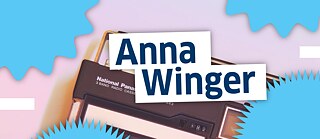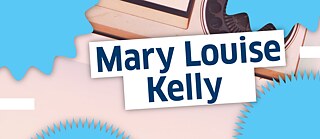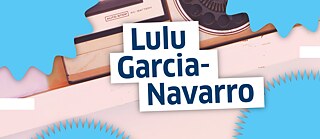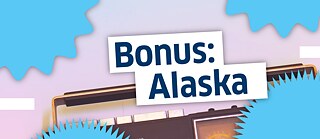Zeitgeister On Air Radio Around the World #8 with Anna Winger

TV producer Anna Winger recently released her miniseries “Transatlantic” on Netflix. Before her TV career, Anna was a photographer and radio broadcaster. She was born in the United States but made her home in Berlin, where she produced around 200 of her “Berlin Stories”. The stories were aired on National Public Radio of the USA (NPR) and were about odd happenings during the Cold War, encoded Secret Service messages transmitted over the radio, and a young clubber from Berlin who swam across the Spree one night to visit her favourite club. In this podcast episode, Anna also tells the story of her childhood – which she spent listening to the radio in places like Kenya and Mexico – and talks about her favourite podcasts.
Subscribe: Apple Podcasts | Spotify | RSS
Transcript
Dina Elsayed: Welcome to Radio Around the World, brought to you by Goethe-Institut. I’m your host, Dina Elsayed, of Common Ground Berlin. Today we’re speaking with Anna Winger, a Berlin-based American screenwriter and producer whose Emmy- and Peabody-winning works, you might have seen on TV. Her latest project is called Transatlantic, a seven-part series that debuted on Netflix earlier this year.
[Music]
The series is inspired by Julie Orringer’s novel, The Flight Portfolio, and the experiences of Varian Fry, Mary Jayne Gold, and Albert Hirschman. They risked their lives to save over 2.000 Jewish and anti-Nazi refugees during the Second World War. But what is less known is that a walk with her dad in Berlin and a subsequent radio story he did provided the initial spark for Transatlantic. Tell us about this fateful Berlin story you heard from your dad, Anna.
Anna Winger: At the time I was producing a show for a local NPR – there was a local NPR station in Berlin – for about maybe 10 years. They needed these pieces to go between the shows that were coming in from the United States, three, four minutes. And so, they asked me if I wanted to produce a series of pieces for that space. What I did was I asked all kinds of writers to write about something they had witnessed or experienced or seen, a story – their own story, something that interested them in Berlin. And we had this crazy range of people doing…they wrote about so many things, swimming across the Spree, trying to get into a club, riot for a cause, to, you know, to Cold War stories, broken romances, and all kinds of stuff about history. And my father, who’s an anthropologist, he wrote a number of pieces for us actually, that were about the street names and about who was Hans Beimler, you know. And in this case he wrote one about who was Varian Fry. There was a Varian-Fry-Straße, and still is here in Potsdamer Platz. And the story of who Varian Fry was, was the basis for me to start researching a TV show about Varian.
Dina Elsayed: Why did you turn this idea and this conversation with your dad into a radio story?
Anna Winger: Well, you know, when I was making Berlin Stories, when I was producing that radio series, I would always be listening for interesting things that people told me that would make a good story. So, if someone who was a writer and in some cases they weren’t even writers, but most were actually professional writers, would tell me something, I would think, “Ah, that would make a really good one.” And what he told me was so surprising because actually it’s like…I like to say it’s ‘the greatest story never told.’ Like, it was this amazing act of courage and all these young people coming together to save, you know, famous artists and intellectuals who really had no way out. It was just an incredible story that deserved to be told. So I asked him to write a Berlin Story about it, which he did. And that was the beginning of thinking about making it into a TV series.
Dina Elsayed: And let’s backtrack to your childhood. Was radio important to you and your family when you were growing up?
Anna Winger: So I’m the daughter of anthropologists. My parents always took my brother and me with them when they were traveling for work. They did field work in many places that were quite remote. And there was very little access to anything but the radio, you know? We certainly never went to the movies or watched TV. But everywhere there was local radio, like when we were living in Kenya, we listened to a lot of BBC World. And when we were living in Mexico, I remember there was one station that broadcast American Top 40, like Casey Kasem’s American Top 40. And at the time I was in middle school and it was like the high point of my week – was to hear all this pop music and I would wait with my tape recorder to press record when songs that I liked would come on the radio. And then later, I’m a photographer – that was my profession for most of my adult life before I started writing and writing television. And I would spend, you know, eight, ten hours in the dark room at a time printing when I was in my twenties and thirties. And NPR, public radio, was my best friend. I would come out…sometimes I would listen to so much NPR that I would listen to the cycle coming back again at the end, you know. I’d be listening to so much that I would get to the news coming back. You know, they would start to replay the same broadcasts. And you know, talk radio and now I listen to a lot of podcasts. You know, it’s such a…it has always been a big part of my daily life. I never, thankfully, had to commute, like a car commute, but when I am in the car, listening to radio…but I try not to be in the car, if I can avoid it. But I do, I’ve always found it very relaxing to hear people talking about something interesting. So yeah, I’ve been… radio has been a big part of my life from the beginning.
Dina Elsayed: You just mentioned podcasts. What are you listening to these days and have your children grown up listening to radio since it’s a big part of your life?
Anna Winger: It’s funny that you say that because one thing I’ve noticed about music, like the absorption of music, you know, I used to hear new music on the radio. That’s how you heard it, you know, whether it was in the car or at home. The radio was always on and you’d hear a new song, you would want to know what that was. There was no other way to find anything new. Then there was MTV, you’d hear, watch music videos, but really radio was the source of information when it came to like pop music. And one thing I noticed because my kids listen to things on Spotify and Apple Music, or whatever it is that they’re listening to music – they don’t hear new music as much. They don’t really experience listening to something that they didn’t choose, right? Everything is now sort of…the algorithm is designed to bring you the things that you want and you like, but not to expose you to new music. So they don’t…unless I play something for them or someone else play something for them deliberately, they don’t naturally hear music they didn’t choose. And that’s a really different way of coming into music than I had it. Because for me, it was like, you just listened to the radio and new things would play all the time on the radio. And I think that’s one of the problems with like on-demand content is that it’s not…it doesn’t…it sort of limits the process of discovery either because you only watch or listen to the things you choose, or because the things that are fed to you by the algorithms are things that you would already like – as opposed to things you don’t know you would like. You know, there was just something really democratic about the radio. Like you just kind of heard the things you liked and the things you didn’t like and eventually you discovered new things that way. The news is another thing, right? Like people now hear the news they pursue, but not necessarily objective news. And there was something about when you listened to the radio regularly, you would hear news breaks. So everybody was kind of informed about the same things. And without that, you know, kind of morning news hour or like news breaks that happened at the top of the hour –like they’d just sort of interrupt pop music to tell you about something. I mean, no one’s interrupting what you’re listening to on Spotify to bring you the news, right?
Dina Elsayed: Just the ads.
Anna Winger: Just the ads. So it really depends. I get what’s positive about on-demand content. I obviously make on-demand content. I think the Spotify algorithm is pretty incredible in terms of how it feeds me things that I would like. Like they know me, you know, it’s very good. However, the process of discovery is definitely limited.
Dina Elsayed: We talked about your dad’s episode for Berlin Stories. What led you to do that radio series more than a decade ago for NPR?
Anna Winger: At the time, I had just started writing. I was working as a photographer and I had written a few essays about my life in Berlin for the New York Times. And the guy who was in charge of NPR worldwide was in the city. And he…we had a meeting and he asked me like, “How about you write about yourself for the radio? You know, we really like the pieces you’ve written for the Times and the Times magazine. You could do something like that for the radio.” And I was like, “I don’t know if I have enough to say about my life. But what if I were to get other writers to write about their lives and their experiences? And we were just to do it as a kind of rolling record of different people’s experiences.” And then they were all pieces that were read by the writers who wrote them. So, it was got a little bit like story-core or something except for that it wasn’t an interview. It was like people, there was an editorial process, people wrote essays. We edited them for radio to get them the script down to the right length and that they were clear and easy to say. They would practice them. And then we would do…we would record them in batches at various recording studios around Berlin, it was really fun. We did it for like maybe five years, six years. And over time we probably did 200 pieces or something like that. And they were all really different. But one thing that’s kind of funny is I never wrote one.
Dina Elsayed: Do you have a favorite?
Anna Winger: It was about how she swam across the Spree to get into Bar 25, which was a club that no longer exists but was kind of legendary. And it was just a really good piece. That one really stayed with me. But people wrote about amazing things that happened to them. And then unfortunately, the whole archive lived on the website that doesn’t exist anymore. And I should have somehow downloaded it all to one place. I only have about half of them on my computer.
Dina Elsayed: It’s just still a wealth if they’re all of the same caliber – swimming in the Spree to reach the club – that’s peak Berlin. Has radio influenced other works that you’ve done?
Anna Winger: I’ve made two historical TV shows. One is called Deutschland 83. And it takes place in the 80s. And one was Transatlantic. And in both cases radio played a real role in the fabric of the show in terms of bringing in the news. Because you know in the past in the 1940s and 30s that’s literally how people got all their information. Because already stuff in the newspaper was much later than…it took a long time for that to get published. The radio was crucial in bringing people information. And that was also true in the Cold War, it was really important. It was also a really powerful tool because they started broadcasting radio from the West over into the East. They couldn’t really stop the radio waves. So there was a way to reach an audience that you wanted to...It was kind of like a kind of friendly fire – a way of using soft diplomacy to reach people on the east side of the [Berlin] Wall. I love the stories of how when the Americans first arrived in Paris after they took Paris back from the Nazis…how they started broadcasting American radio. And these stories like how they had André Breton speak to the French people in a voice that they recognized. I find these things really moving – how a voice can be familiar, how it can give you the sense of being at home, how important language is. I think radio narrative has influenced a lot of the work that I’ve done. So, okay, so another thing about radio that has always really interested me in terms of the narrative possibilities is the way it’s been used in spy drama. Like, or the way it’s been used to communicate information secretly. I’ve been working recently on a project that’s set in the struggle against apartheid and they used radio a lot to communicate. You know, it’s sort of like hiding in plain sight, right? Like radio was broadcast all over the world. But if you were using the right kind of music, if you were using the right kind of certain codes, saying certain phrases…there was ways of communicating information and something we used in Transatlantic that was fun was that they used the first few bars of Beethoven’s Fifth to basically communicate French resistance messages on the radio. And whenever you heard Beethoven’s Fifth, like [impression of the melody] it was the beginning of these kind of nonsensical poems, surrealist poetry, which actually had hidden messages in them. And I think that kind of thing is really cool. So there’s a lot of radio stories still yet to tell even if people…and if people aren’t doing it now, then all those stories are just waiting for us to tell them. And you asked me earlier about podcasts and I do listen to a few podcasts regularly. Some of them are NPR shows that I used to listen to on the radio – like Fresh Air and The Business. But I also listen regularly to Mark Maron, like WTF – I think his interviews are really good. At the beginning, I found his personality kind of annoying, but now I’m like “What happens with the cats?” Like, it’s really strange how he’s grown on me. You know, I think there’s a lot of podcasts. But for me, what I really like is the ones that tell you, like, that are limited. So it’s like they do a research into a particular time period or subject and you can listen to six, eight episodes and get a full download about something that interests you. I’m listening to one now about Riot Grrrl that was done by Oregon Public Radio. And it was like, it was about music in the early 90s, women who were in rock bands. It’s just really good. You know, it’s a way of learning something but kind of as if you’re having a conversation about it with people who really know a lot about it. So yeah, I mean, podcasts are cool. But it’s still different from listening to the radio because that process of discovery or hearing something that you didn’t intend to hear, is not the same.
Dina Elsayed: That brings me to my last question. The series we are interviewing you for commemorates a century of German radio. Do you think radio still plays an important role in society at large?
Anna Winger: I don’t. I mean, how do I put this? I think podcasts do. I think people are still like listening to oral content. But other than in the car, I don’t hear the radio playing very often. You know, you just…there aren’t a lot of…the radio used to be on in every shop. It was on in many workplaces. You know, we listened to it first thing in the morning when we woke up in the morning. I mean, Morning Pro Musica, a classical music program in the United States, I think was like the soundtrack of my early part of my day throughout my education in the U.S. It’s not that I don’t think it’s relevant, but I don’t think it’s reaching people in the same way. And I want to be clear that I’m talking about like living in a first world city, right? Or whatever you want to call Berlin. I’m guessing that if you travel to the kinds of places that I lived as a child when we were…when I was doing field work with my parents, I’m guessing that the radio still plays more of an important role on the road, you know, like a little bit outside city centers and stuff. Certainly…we spend the summers in Maine, which is a kind of rural part of the United States. And radio there is more important than it is here. You know, because people spend so much time in their cars, they listen to the radio, even just to get weather updates and traffic updates. These are things you can’t get anywhere but the radio, right? So if you have a reason to plug in – and I think drivers have a lot more of a reason than people in the city –, then I think it probably does play a more significant role in your lives.
Dina Elsayed: That was Emmy- and Peabody-winning screenwriter and producer Anna Winger. I’m Dina Elsayed of Common Ground Berlin and thank you for listening.
Host: Radio Around the World is brought to you by the Goethe-Institut. Thank you to all of our friends and partners for making this series possible. [Music]


